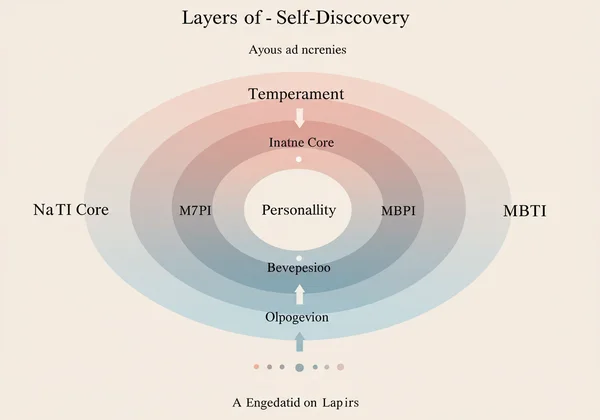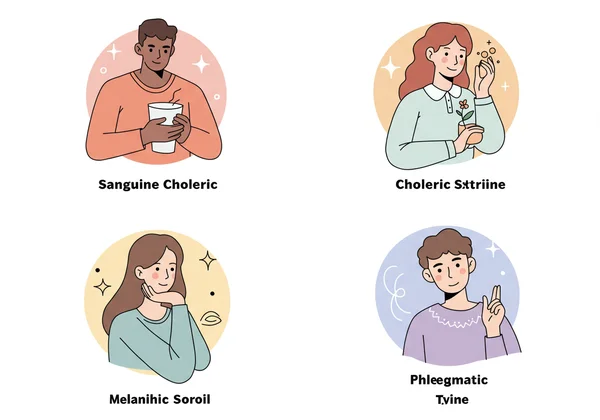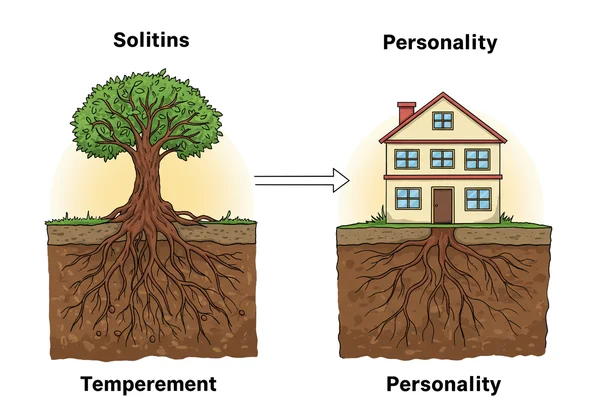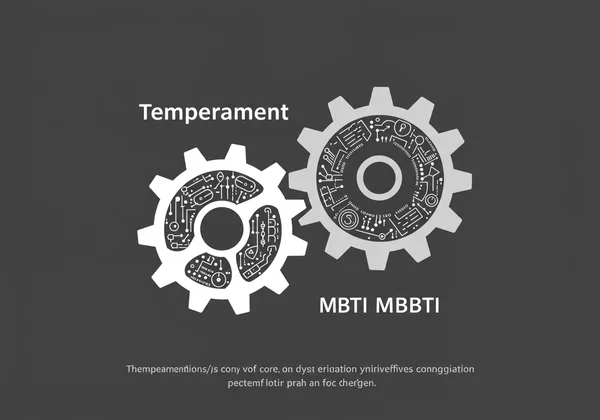Temperament Test vs. Personality & MBTI: Understanding Your Innate Core
Embarking on the path of self-discovery often leads to a tangle of terms: temperament, personality, MBTI. While each offers unique insights into who you are, it's easy to feel lost in the distinctions. Are they interchangeable? What truly sets them apart, and how can each help you understand your deepest self? What is the difference between a personality test and a temperament test?
If you've ever felt that your personality seems to change with the situation, but something deeper remains constant, you're onto a profound truth. This article will clarify the distinctions between these powerful concepts. We'll explore your innate blueprint (temperament), the person you've become (personality), and the way you think (MBTI). Get ready to understand the foundational layer of you, and when you're ready, you can start your journey of self-discovery with a reliable tool.

What Exactly is Temperament? Your Innate Blueprint
Think of temperament as the foundation of your psychological house. It's the biologically-based, inborn set of tendencies that you arrived with. This "innate blueprint" governs your core emotional responses, energy levels, and behavioral style from a very young age. It’s the part of you that feels most natural and effortless, influencing how you react to the world before conscious thought or social conditioning kicks in.
Temperament is not about what you do, but how you do it. Are you naturally energetic and outgoing, or are you more reserved and reflective? Do you adapt quickly to change, or do you prefer stability and routine? These core patterns are the domain of temperament. Understanding your temperament is the first step in any meaningful personality temperament test.
The Four Classical Temperaments: A Brief Overview
The concept of temperament dates back to ancient Greece and has been refined over centuries. It is traditionally categorized into four types, each with a unique cluster of traits:
-
Sanguine: Enthusiastic, sociable, and optimistic. They are often the life of the party but can be prone to impulsiveness.
-
Choleric: Goal-oriented, decisive, and assertive. They are natural leaders but can sometimes be seen as dominant or impatient.
-
Melancholic: Thoughtful, detail-oriented, and sensitive. They are deeply creative and analytical but may struggle with perfectionism and pessimism.
-
Phlegmatic: Calm, reliable, and easygoing. They are excellent mediators and friends but may need motivation to act.

How Temperament Differs from Learned Behaviors
Your temperament is the raw material, while learned behaviors are the skills and habits you build over time. For example, a person with a naturally reserved Phlegmatic temperament can learn to be an effective public speaker through practice. However, it will likely consume more of their energy than it would for a naturally outgoing Sanguine individual. Temperament is the starting point; it's the nature part of the "nature vs. nurture" equation.
Temperament vs. Personality: Decoding Your Core vs. Your Persona
If temperament is the foundation, personality is the entire house built upon it. Temperament vs. personality is one of the most common points of confusion. Personality is a much broader and more complex structure that includes your temperament but also encompasses your values, beliefs, memories, habits, and social roles. It's the unique and relatively consistent pattern of thinking, feeling, and behaving that makes you you.

Your personality is shaped by your innate temperament interacting with your life experiences, culture, education, and relationships. It’s your public and private persona—the character you present to the world and the one you know yourself to be. This is why a personality and temperament test can offer such rich insights, but understanding the difference is key. Ready to see your foundation? You can take a temperament test online.
Stability vs. Adaptability: Key Differences Explained
The most crucial difference lies in their stability. Temperament is highly stable throughout your life. A child who is naturally cautious and slow to warm up (perhaps Melancholic or Phlegmatic) is likely to retain that core tendency as an adult. Personality, on the other hand, is more adaptable. It can evolve and change as you learn, grow, and navigate new life stages. You can develop new coping mechanisms, change your beliefs, or adopt new social skills, all of which modify your personality.
The Interplay: How Temperament Influences Personality Development
Temperament doesn't determine your personality, but it strongly influences it. A Choleric temperament might predispose someone to develop a confident, take-charge personality, especially if their environment rewards that behavior. A Melancholic temperament might lead to a more artistic and introspective personality. Understanding this interplay is powerful; it helps you work with your natural tendencies rather than against them, leading to more authentic personal growth.
Temperament & MBTI: Complementary Insights for Self-Discovery
The Myers-Briggs Type Indicator (MBTI) is another popular tool for self-understanding, but it measures something different from temperament. While temperament is about your innate emotional and behavioral core, the MBTI focuses on your cognitive preferences—how you prefer to perceive the world and make decisions. It looks at four dichotomies: Introversion/Extraversion, Sensing/Intuition, Thinking/Feeling, and Judging/Perceiving.

While there can be overlap (e.g., a Sanguine temperament often correlates with Extraversion), they are not the same system. The debate of MBTI vs temperament is less about which is better and more about what each reveals. One looks at your foundational "why," while the other explores your preferred "how." When you are ready to explore this foundational "why," we invite you to discover your temperament.
Beyond Preferences: Why Temperament Offers a Deeper Dive
The MBTI is excellent for understanding your thought processes and communication style. However, temperament goes a layer deeper to your biological predispositions. It explains why you might have a certain energy level or emotional reactivity in the first place. For example, two people might be "Thinkers" in the MBTI framework, but a Choleric Thinker will approach a problem with more aggressive energy than a Phlegmatic Thinker, who will be calmer and more methodical. Temperament provides the underlying context for your MBTI preferences.
Using Both Tools for Comprehensive Self-Understanding
The most enlightened approach is to see these tools as complementary. Using a 4 temperaments test gives you insight into your core, innate drives. Using the MBTI can help you understand how those drives are expressed through your thought patterns. Together, they provide a richer, more complete picture of who you are, helping you build a life that honors both your innate nature and your developed preferences.
Your Temperament: A Powerful Compass for Personal Growth
The journey of self-assessment can be complex, but grasping these core differences is truly empowering. Think of temperament as your innate, stable blueprint. Personality is the adaptable structure you've built over a lifetime. And the MBTI? That's a useful snapshot of your cognitive preferences. Together, they offer unique perspectives into your very being.
By starting with your temperament, you connect with the most fundamental part of yourself. It allows for greater self-acceptance and provides a clear roadmap for personal and professional growth that aligns with your true nature. Ready to uncover your core? Our scientifically-backed free temperament test offers clear, actionable insights into your innate blueprint. Take our free temperament test today and begin building a more authentic, fulfilling life.
Common Questions About Temperament & Personality
What is the primary difference between temperament and personality?
The primary difference is that temperament is innate and stable, representing your biological blueprint for emotional and behavioral reactions. Personality is developed and more adaptable; it's a broader concept that includes temperament, plus your beliefs, values, and life experiences. Think of temperament as the raw marble and personality as the finished sculpture.
How do the four temperaments relate to broader personality theories like MBTI?
The four temperaments provide the "why" behind your energy and emotional responses, while theories like MBTI explain the "how" of your thought processes and decision-making. They are complementary. For example, an MBTI "Extravert" might have a Sanguine temperament, which explains their natural enthusiasm and social energy. A different Extravert might be Choleric, explaining their drive to lead conversations. Understanding your temperament adds depth and context to your MBTI type.
Are temperament tests scientifically accurate?
Yes, when based on established psychological theories. The concept of the four temperaments has a long history and is a foundational element of many modern personality theories. A reliable temperament types test, like the one offered here, is designed to identify your predominant tendencies based on consistent behavioral patterns. While no test is a substitute for professional diagnosis, it is a scientifically-grounded tool for self-exploration.
How can understanding my temperament help me in daily life?
Knowing your temperament can revolutionize your daily life. It can help you understand your natural strengths and challenges, improve your relationships by recognizing others' temperaments, choose a more suitable career path, and develop effective stress management strategies that work with your nature, not against it. It's a key to living more authentically.
Where can I take a free and reliable temperament test?
You can find a free, scientifically-backed online temperament test right here on our platform. Our test is designed to be quick, user-friendly, and insightful, providing you with a standard report or an optional, AI-driven personalized analysis to help you apply your results to your life. Get your results now and start your path to deeper self-understanding.